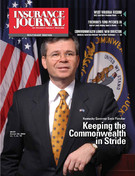Kentucky Gov. Ernie Fletcher (R) has had a busy last few weeks. Between weighing in on the AIK Comp Fund issue in the Commonwealth and seeing to it that residents get the help they need from storms that rumbled through earlier this summer, Fletcher has had a full plate on his schedule.
Prior to becoming governor, he gained experience in a number of fields, including as an Air Force fighter pilot, engineer, family doctor, lay minister, state legislator, and U.S. Congressman. The governor has used his diverse background to tackle the issues facing Kentucky and offer a vision for the future.
Gov. Fletcher recently took time out of his schedule to do an e-mail interview with Insurance Journal Southeast and discuss some of the insurance-related issues facing the Commonwealth.
Insurance Journal: Talk a little bit about the AIK Comp situation in Kentucky and where do you see things going with workers’ comp in general in the Commonwealth?
Gov. Fletcher: In an effort to protect every Kentucky worker and to provide better policy oversight to group self-insured workers’ compensation funds, such as the Associated Industries of Kentucky selective self-insurance fund (AIK Comp Fund), I signed an executive order on August 3rd directing that the Office of Insurance will now regulate such funds in the Commonwealth.
I am appalled about the historically poor oversight of group self-insurers and their operations in Kentucky. We have new management which has done an initial assessment and recommended transferring these funds to the Office of Insurance, which has more expertise to oversee them and more regulatory options. This increased regulatory oversight will provide more stability to the financial integrity of the workers’ comp fund and provide stronger protection for Kentucky workers.
A $40-million deficit projected by the AIK Comp Fund through policy year 2002 prompted my decision to tighten oversight of this market. Additionally, an independent audit now indicates the projected reserve deficit at $53 million through the 2003 policy year.
We have also recommended immediate action, beyond the transfer. We requested that AIK Comp submit a revised assessment plan for policies through 2002 to ensure all workers’ claims are paid and that small businesses are not bankrupted. We now have what we believe is an acceptable plan from AIK Comp. We also expect the Office of Insurance to institute rehabilitation proceedings soon.”
IJ: Kentucky has suffered through some tough storms recently with flooding, etc. How has the Commonwealth reached out to help residents and businesses in need?
Fletcher: So many Kentucky families and communities were greatly affected by the recent severe storms and tornadoes. I am proud of the way all facets of state government came together to assist those in need. For instance, employees of the Transportation Cabinet spent countless hours clearing debris from Kentucky roads so emergency crews and help could safely arrive to rural communities. The Kentucky National Guard brought in drinking water to the affected areas. Volunteers organized shelters where families could go to rest and eat. It was truly a collaborative effort on so many levels. Additionally, I made a request to President Bush to ask for federal assistance to ensure that needed infrastructure and homes be restored. In response, the President ordered that federal aid be made available to supplement state and local recovery efforts. As of June 29, 2004, FEMA had 9,469 residents call in and register for assistance. More than $19.5 million has been allocated for assistance during this disaster. Kentucky was also able to offer federal f
unding for the repair or replacement of public facilities damaged by the storm and flooding to eligible local governments on a cost-sharing basis. Lastly, home and business owners with insurance were also eligible for assistance through the Small Business Administration.
IJ: What is Kentucky doing to attract new business to the Commonwealth, including insurance companies?
Fletcher: Economic development is definitely one of the top priorities of this administration. That is why my tax modernization plan, Jobs and Opportunity Bipartisan Solution, or JOBS for Kentucky, is so critical for the Commonwealth. JOBS for Kentucky would reform our antiquated tax code and reduces taxes for 98 percent of Kentucky families. Additionally, I am proud that since I have come into office, and largely in part because of President Bush, 68,000 new jobs have been created in Kentucky. That is quite a feat.
Furthermore, state agencies, including the Office of Insurance, have been asked to take a close look at statutes and regulations to see where unnecessary barriers exist that may be preventing businesses from locating in Kentucky. HB 650, passed by the 2004 General Assembly, is one result of this process. HB 650 streamlines the reporting process for health insurance companies while continuing to offer consumer protections.
We believe these changes will foster more competition by making the Kentucky marketplace more like that of the nation as a whole. I have asked the Health and Family Services Cabinet secretary, Dr. James Holsinger, to lead an effort to attract more health insurance companies to Kentucky. Dr. Holsinger and the Office of Insurance staff are working to convene a Governor’s Forum for health insurers interested in returning to the Kentucky market. By sitting down with company officials, we hope to learn what efforts we can make to strengthen competition while continuing our commitment to protect consumers and maintain a stable, healthy insurance market.
IJ: Medical malpractice is a crisis issue in many states. How do you view it in Kentucky and do you see it as a major problem?
Fletcher: As a physician, I believe the Commonwealth of Kentucky is indeed in a medical malpractice emergency. In fact, the American Medical Association last year declared Kentucky to be a “crisis” state when it comes to the malpractice liability system. Kentucky currently does not impose a statutory cap on damages recoverable in medical malpractice actions.
The fact of the matter is, the high price of medical liability insurance is causing insurance companies to raise premiums and is driving physicians from the Commonwealth. The crisis could lead to devastating shortages of specialists like obstetricians and surgeons. Both the Kentucky Medical Association and the Kentucky Hospital Association support a statutory cap on damages. As Governor, I am committed to creating a medical malpractice system that both protects patients and keeps insurance affordable for providers.
During the 2004 General Assembly, I supported Senate Bill 1; a proposed constitutional amendment to cap jury awards and allow lawmakers to limit punitive damages, awarded for pain and suffering, to $250,000. Unfortunately, the bill died in the session. However, medical malpractice reform remains one of my top priorities in the upcoming General Assembly.
IJ: What are your goals for the remainder of the year for the governor’s office?
Fletcher: My administration remains committed to promoting economic development, providing top-notch education and making Kentucky healthier. It is critical to continue to work to pass a budget to maximize the tools available to my administration to achieve these goals. I will continue to work to reach a responsible budget that begins to modernize our outmoded tax code to encourage jobs and growth in this state. We are doing all we can to attract new businesses and new residents to Kentucky.
Increasing access to affordable healthcare is a primary goal of my administration. Health insurance premiums continue to rise at alarming rates. These increases are making it more difficult for small businesses, individuals, and the Commonwealth to continue to provide health coverage in the most effective and efficient manner. Drivers of these escalating costs in Kentucky continue to be a lack of competition among health insurance providers, over-regulation of the health insurance market, and the poor, overall health of our population.
We are working to recruit insurers back to the Commonwealth by reducing the paperwork and creating a friendlier business climate for them to compete. The First Lady and I, along with the Secretary of Health & Family Services, recently launched “Get Healthy Kentucky!” to educate Kentuckians on choosing a better diet and managing chronic illnesses.
Increased competition, deregulation, and a focus on educating Kentuckians on Getting Healthy will promote a more effective and less costly health care system in our state.
We are also taking the lead nationally on a new statewide branding campaign to give Kentucky one vision and one brand for all to recognize. I’m very excited about this campaign, which has sparked interest from other states as well as national media. We should be ready to unveil our new brand for Kentucky later this year.
IJ: Has this job been everything you thought it would be?
Fletcher: This job has been everything I thought it would be, and so much more. Even though I have been in office for eight months now, I am still amazed at how many lives I have the ability to improve, and the opportunity I have to make a difference in this great Commonwealth. My goal is to move Kentucky forward into the new economy, to bring more and better jobs to the workers of this state, and to provide better opportunities for health care to each and every family that lives here. This administration is dedicated to putting people above politics, doing what is best for Kentucky. That is my vision for the future.
To learn more about Gov. Fletcher, visit http://governorky.gov/
Was this article valuable?
Here are more articles you may enjoy.


 Zurich Insurance Profit Beats Estimates as CEO Eyes Beazley
Zurich Insurance Profit Beats Estimates as CEO Eyes Beazley  Carmakers Push Toward ‘Eyes-Off’ Driving, Raising Questions of Safety, Liability
Carmakers Push Toward ‘Eyes-Off’ Driving, Raising Questions of Safety, Liability  Sompo Receives Regulatory Approvals to Acquire Aspen Insurance in $3.5B Deal
Sompo Receives Regulatory Approvals to Acquire Aspen Insurance in $3.5B Deal  Judge Tosses Buffalo Wild Wings Lawsuit That Has ‘No Meat on Its Bones’
Judge Tosses Buffalo Wild Wings Lawsuit That Has ‘No Meat on Its Bones’ 


